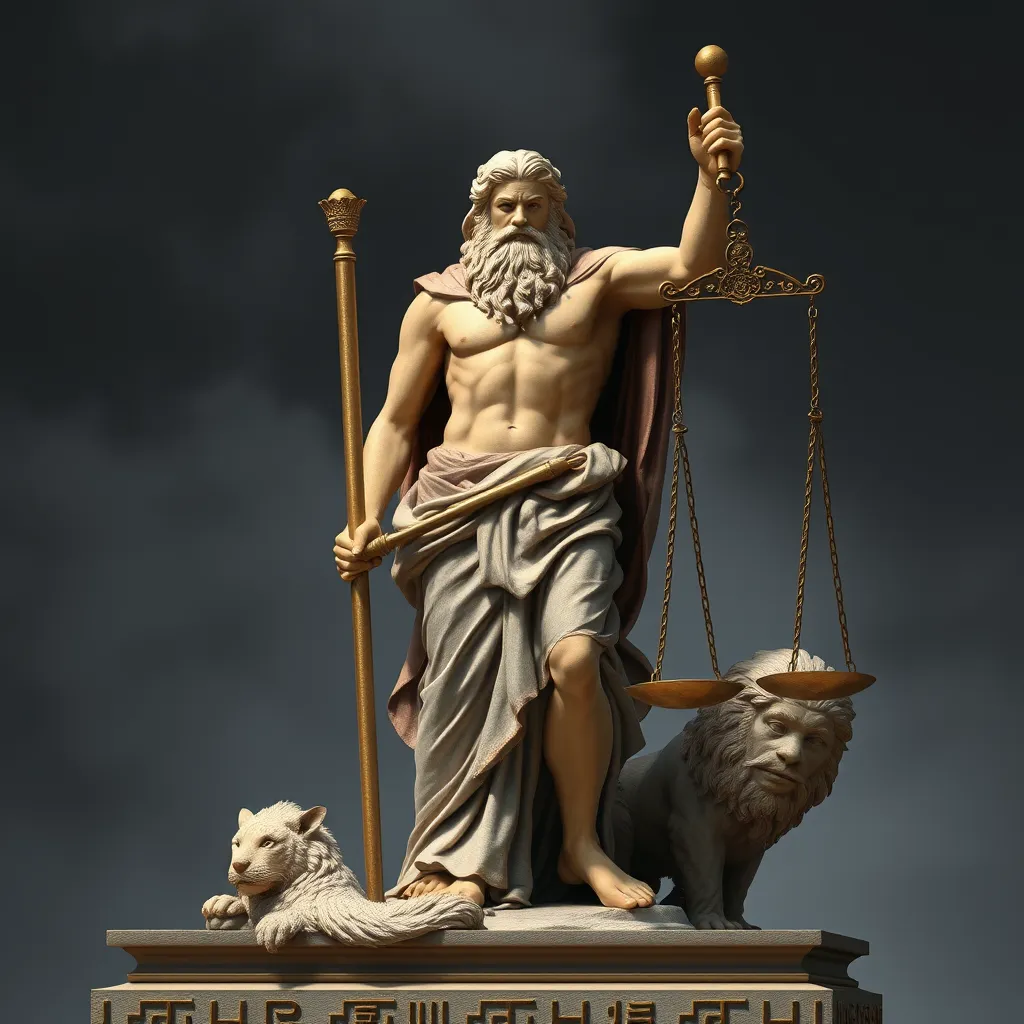Zeus and the Concept of Justice: The Role of Dike
I. Introduction
In the rich tapestry of Greek mythology, Zeus stands as a paramount figure, revered as the king of the Olympian gods and the ruler of Mount Olympus. His persona embodies not only power and authority but also the critical concept of justice, which held profound significance in ancient Greek society. Justice, or ‘dikaiosyne,’ was essential to maintaining order in both the divine and mortal realms. At the heart of this concept is Dike, the personification of justice, who plays a vital role in the cosmic order and the moral fabric of humanity.
II. The Nature of Zeus as a Ruler
Zeus’s authority among the Olympian gods is unparalleled. He is not merely a figure of might but also a mediator who resolves conflicts among the gods and humans. His judgments reflect a deep commitment to justice, ensuring that order prevails in the universe.
- Zeus as a Mediator: In various myths, Zeus intervenes in disputes, acting as a fair arbiter who weighs the needs and rights of all parties involved.
- Enforcer of Justice: Zeus wields the thunderbolt, a powerful symbol of divine justice. This weapon serves not only as a tool of punishment but also as a reminder of the consequences of wrongdoing.
The thunderbolt itself has come to symbolize the swift and impartial nature of divine justice, striking down those who defy the moral order established by the gods.
III. Understanding Dike: Personification of Justice
Dike, whose name translates to “justice” or “judgment,” has her roots deeply embedded in Greek mythology. She is often depicted as a young woman, carrying scales and a sword, embodying the principles of fairness and balance.
- Origin and Etymology: The word ‘Dike’ derives from the Greek term ‘dikaiosyne,’ which signifies righteousness.
- Attributes: Dike’s attributes include her scales, representing the weighing of evidence and moral choices, and her sword, symbolizing the enforcement of justice.
- Significance: In the cosmic order, Dike acts as a guardian of justice, ensuring that natural and moral laws are upheld.
Dike’s relationship with other deities is significant; she often collaborates with Zeus, amplifying the enforcement of justice across the realms.
IV. The Interconnection Between Zeus and Dike
The relationship between Zeus and Dike is one of mutual reinforcement. Zeus embodies the principles of justice through his actions, while Dike personifies these principles in a more tangible form.
- Embodiment of Justice: Zeus is seen as the ultimate source of justice, with Dike serving as his divine assistant in executing his will.
- Mythological Narratives: Numerous myths illustrate their dynamic, showcasing how they collaborate to restore order and balance.
One such myth involves Zeus punishing the Titans for their rebellion, with Dike ensuring that the punishment is just and proportional to their transgressions.
V. Justice and Morality in Ancient Greek Society
In ancient Greece, justice was a fundamental societal expectation. The Greeks believed that the gods, particularly Zeus and Dike, were guardians of justice, and their influence permeated various aspects of life.
- Societal Expectations: Justice was not merely a legal concept but a moral imperative that governed human behavior.
- Dike as a Moral Compass: Dike served as a guiding force, encouraging individuals to adhere to ethical standards and societal norms.
- Influence on Legal Standards: The principles embodied by Zeus and Dike laid the groundwork for the development of legal systems and ethical frameworks in ancient Greece.
This intertwining of divine justice and human morality established a foundation for the Greek understanding of law and order.
VI. Dike in Literature and Philosophy
Dike’s representation in classical literature and philosophy reflects the evolving understanding of justice in ancient Greek thought.
- Literary Representations: Authors like Hesiod and Aeschylus portrayed Dike as a powerful figure who intervenes in human affairs to restore justice.
- Philosophical Interpretations: Thinkers such as Plato and Aristotle examined the nature of justice, often referencing Dike as the ideal embodiment of fairness and moral order.
- Evolution of Dike’s Role: In later philosophical discourse, Dike’s significance continued to resonate, influencing discussions on ethics and morality.
These literary and philosophical explorations highlight the enduring relevance of Dike in the quest for understanding justice.
VII. The Legacy of Zeus and Dike in Modern Context
The impact of Greek concepts of justice, as represented by Zeus and Dike, extends into contemporary thought and legal systems.
- Influence on Modern Legal Systems: The ideas of fairness and accountability, as embodied by Dike, have shaped modern legal frameworks.
- Moral Philosophies: The discussions on justice initiated by ancient Greek philosophers continue to inform modern ethical theories.
- Relevance Today: The interplay between divine justice and human morality remains a pertinent topic in discussions about justice, law, and ethics in contemporary society.
As societies grapple with issues of justice and equity, the legacy of Zeus and Dike provides a rich source of insight.
VIII. Conclusion
In summary, the significance of Zeus and Dike in the concept of justice is profound and multifaceted. They embody the ideals of fairness, accountability, and moral order that were central to ancient Greek society. Their roles in mythology not only elucidate the nature of justice in a divine context but also offer timeless lessons on the importance of justice in human affairs.
As we continue to explore the interplay of divine justice and human morality, the enduring legacy of Zeus and Dike remains a vital part of our understanding of justice today.




